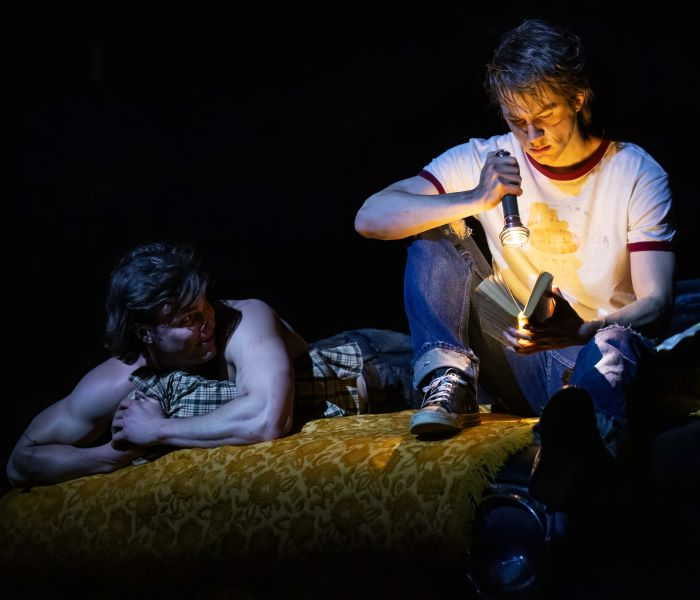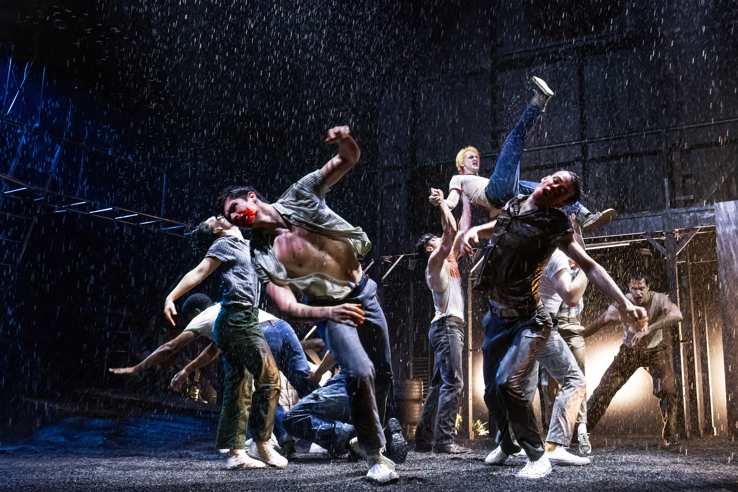Translate Page

Jason Schmidt and Brody Grant in The Outsiders on Broadway. Photo by Matthew Murphy.
The show's creative team talks about adapting S.E. Hinton's searing novel for the stage
---
After the curtain fell on the first preview of The Outsiders, the new Broadway musical inspired by S.E. Hinton's enduring coming-of-age novel, director Danya Taymor was approached by the mother of a cast member. She could only get out two words.
"The silence…" Taymor recalls her saying, then repeating excitedly: "That silence!"
By Broadway musical standards, The Outsiders, currently running at the Bernard B. Jacobs Theatre, is an intense show. The ferociousness of Taymor's staging is felt in its muscular physical vocabulary, its fervently openhearted score by folk duo Jamestown Revival and the tension-filled silence that fills its most intimate moments.
Taymor was committed to those silences. So were two of her key collaborators in adapting Hinton's story: book cowriter Adam Rapp and Justin Levine, a multihyphenate who serves as the production's co-songwriter, book cowriter, music supervisor, orchestrator and arranger. The trio was intent on making the tale of Ponyboy—a poor, orphaned Greaser trying to survive in 1967 Tulsa, Oklahoma—as hard-hitting as the novel.
"Ponyboy's story is not a soft one—it's brutalist," explains Rapp. "It's a sophisticated story of grief and loss and how one finds their voice. None of us wanted to shy away from that."
Living in that brutality meant allowing, in some of Ponyboy's more unguarded moments, a sustained and demanding level of stillness.
The quiet comes when a bruised and beaten Ponyboy (Brody Grant) has a late-night heart-to-heart with his brother Sodapop (Jason Schmidt) after being jumped by the Socs, the rival gang of rich kids from the nicer side of town. He tells Sodapop that he keeps dreaming of their parents, who were killed when their car was struck by a train. "Do you ever dream about 'em?" Ponyboy asks. Save for the sound of a distant train, a piercing silence fills the theatre as the question hangs in the air.
Ponyboy shares a softer, more comfortable quiet with his best friend Johnny Cade (Sky Lakota-Lynch) as the two sit together in the park late the next night, wondering if they will ever make it out of Tulsa.
"A musical is such an amazing form to access silence," says Taymor, noting its marked contrast to ensemble numbers, set pieces and ballads, which The Outsiders also has in spades. She hoped to capture the familiarity of "sitting with someone who knows you so well, you don't even need to speak."
Silence also demands that theatregoers lean in closely and take these young boys seriously in all their aching humanity. To that end, Levine weeded out most of the underscoring in the show's book scenes during a 2023 tryout at La Jolla Playhouse, hoping to keep the audience's focus on the "musicality" of the language.
"When I think of my favorite musicals, they aren't just about getting from point A to point B," Levine says. "They're about dropping into someone's emotional life."
The creative team's unflinching approach is authentic to Hinton's 1967 book, which has captivated teenage readers for generations precisely because it does not shy away from the harsh realities of the world. That's evident not only in the show's dialogue, but also in the musical's physical language, particularly its hyperrealistic depiction of the violence plaguing these boys.

When the Greasers and Socs brawl, punches land with a loud crack and a flash of light, eliciting gasps from the audience. Gravel and spit fly across the stage. Taymor and sibling co-choreographers Rick and Jeff Kuperman drew inspiration from a striking stage direction in Rapp's script describing the final rumble between the Greasers and the Socs: The brutal sounds of boys grunting—fists detonating into flesh.
Hinton "wrote about the real harm that violence does when it becomes a daily occurrence in the lives of young people," says Taymor. "So, it felt important to depict violence as it feels."
For the rumble itself, the music drops out entirely, leaving only that grunting, moaning and wails of pain. Gradually, a fight between two groups shifts into a collective act of self-destruction. Technically, one side prevails, but no one wins.
The (spoiler alert!) central killing that drives the narrative, forcing Ponyboy and Johnny into hiding, is also portrayed more explicitly than in previous iterations of the story. The novel is told from Ponyboy's perspective. So, he does not witness Johnny's desperate attack on a Soc who is drowning Ponyboy. Francis Ford Coppola's 1983 film adaptation cuts away at that moment, showing only the aftermath.
On stage, we not only see the slaying but feel it—Ponyboy gasping for breath, the crunching impact of Johnny's blade, a body slumping down lifeless. "It was really important to me to put forward the ferocity of it," said Rapp. "These boys are fighting for their lives."
The final element in evoking Ponyboy's fraught emotional journey was the music. Tasked with integrating the songs into the story, Levine says his job was made easy by the natural overlap in voices between the songwriters, Jonathan Clay and Zach Chance, and Rapp.
"John and Zach have this combination of a cowboy spirit and boyish innocence," Levine says. "And I think Adam is much the same—he has this wild, beautiful brain but is very much a forever child." The two voices "feel like they come from the same soul."
Levine encouraged Clay and Chance to put aside "preconceived notions about what Broadway sounds like." Their eclectic score mixes defiant 1960s rockabilly, plaintive ballads, folk, bluegrass and soul, and treats these teenagers' inner torment with sincerity and emotional honesty—just like the book and direction.
When adolescents and student groups see The Outsiders, Taymor says they are responding to a production that, like the novel, does not pull punches. It acknowledges the real and terrible forces that shape young people's lives. Taymor wishes she could have seen something like it following the loss of a close friend to suicide at age 13.
"I think if I'd had something like this to help me through, it would have made me feel less alone," says Taymor. "Because that stuff happens to you when you're that age. It happens earlier than it ought to."
---
The Outsiders is frequently available at our TKTS Booths.